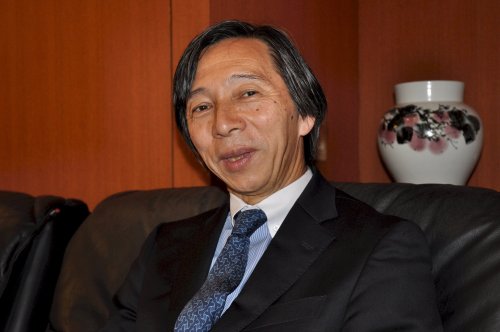Annual festival celebrates life, togetherness and rebuilding disaster area
If you want to experience several Japanese festivals in one location then the Omatsuri Festival is the right place to be this weekend.
“What is most interesting about this festival is that even if you go to festivals in Japan, you can only see one,” said Japan Ambassador Masatoshi Muto to The Korea Herald.
The annual Japanese Embassy extravaganza will take place on Sept. 25 at Seoul Plaza in front of City Hall and will offer not only Japanese music and dance, but will also team up performers from both countries for a day characterized by togetherness.
“It’s very interesting to see how Japanese people celebrate the harvest season for example, so the most important thing is that you can enjoy and compare many types of festivals,” Muto said.
The festival runs from 1 p.m. to 8:30 p.m. encompassing every square inch of Seoul Plaza.
Besides performances from many different corners in Japan, there will be Japanese-style games to try such as yo-yo fishing as well as traditional Korean games.
Also, there will be Korean foods to enjoy and a photo zone where people can immortalize themselves in picture form wearing Japanese and Korean traditional clothing like the yukata and hanbok.
A total of eight Japanese teams will perform as well as nine Korean teams and four joint groups showcasing the beauty of both countries.
Feeling of togetherness
“Korea-Japan relations have improved during the past two decades largely due to people-to-people relations and we want to have fun together, both Korean and Japanese people participating in these kinds of festivals,” Muto said.
For the spectators,
 |
Japanese Ambassador Masatoshi Muto. (Yoav Cerralbo/The Korea Herald) |
the ambassador explained that the festival evokes common feelings of togetherness.
“That’s why we do this every year,” he said, no matter what the cost.
The other main theme for this year’s festival is to help with the recovery efforts of the Tohoku region, which suffered a devastating earthquake that triggered extremely destructive tsunami waves of up to 40.5 meters and caused the ongoing nuclear crisis at the Fukushima Nuclear Power Plant.
The Japanese National Police Agency confirmed 15,769 deaths, almost 6,000 injured, and over 4,000 missing, as well as over 276,000 buildings either partially damaged or completely destroyed.
The overall cost could exceed $221 billion according to recent figures by the Japanese government with other indicators pegging the cost of recovery at over $300 billion, making it the most expensive natural disaster on record.
Tohoku festivals in Seoul
Yet Tohoku still preserves its reputation for being home to some of the most exciting festivals in Japan.
That is why the embassy has brought to Seoul four festivals that they hope will attract visitors back to one of the most special places in Japan.
The Kanto Festival held in Akita City is one of those to be showcased in Seoul and ranks as one of Tohoku’s top three festivals. It has been designated an Important Intangible Folk Cultural Property and has become a symbol for Akita.
What will be seen in Seoul are numerous candle-lit lanterns known as “kanto” hung on a bamboo frame looking like a glowing ear of rice.
The Nebuta Festival from Aomori City will feature small glimpses of the parade that showcases huge lanterns in the shape of samurai warriors.
One that should not be missed is the vibrant traditional Morioka Sansa Dance Festival which celebrates the banishment of a demon.
“We do not think that with this one festival we can achieve many things,” admits Muto. “We would like Korean and Japanese people to get together and enjoy themselves. If you feel emotionally excited and feel close to each other, I think that’s good enough.”
Muto added that he hopes the festival will draw people to visit these areas in Japan.
Growth of business
The people-to-people exchange is just one facet of an overall relationship that is growing by leaps and bounds every year.
On the business side, many Japanese companies are opting to set up shop in Korea attracting over $2 billion of investments last year, the largest from any country.
While some companies have started to look at Korea as a valuable option for their manufacturing plants due to the decrease in available electricity in Japan, Muto explained that it is just one factor in a growing relationship that has seen Japanese companies invest in Korea for several years.
“What is most important between the two countries is the future. We are starting to work together to acquire energy and resources together,” he said, which benefits both countries’ buying power.
The lucrative sector of infrastructure development, estimated at $71 billion by the OECD, is another sector where Muto would like to see more cooperation.
“This will be very important for the development of both countries,” he noted.
As for the free trade negotiations between the two countries, Muto said that he hopes it will happen soon.
“The new trend in economic relations will make us feel much more aggressive and interested in concluding this agreement for the benefit of both countries,” he said.
“In 5-10 years from now, this is going to be a huge benefit because the companies of our two countries will work much more closely overseas and make it much easier to cooperate.”
By Yoav Cerralbo (
yoav@heraldcorp.com)








![[Today’s K-pop] Blackpink’s Jennie, Lisa invited to Coachella as solo acts](http://res.heraldm.com/phpwas/restmb_idxmake.php?idx=644&simg=/content/image/2024/11/21/20241121050099_0.jpg)